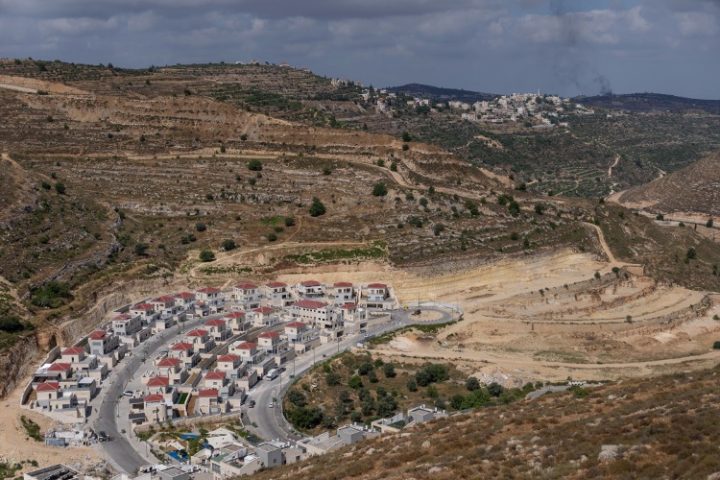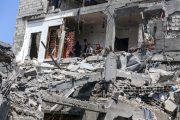
The Israeli government has earmarked nearly 2,000 acres in the West Bank as state-owned land in a move portrayed by human-rights groups as the biggest land grab in the Palestinian territories in decades.
Most countries consider the expansion of Jewish settlements in the West Bank illegal under international law. In 2016, the UN Security Council described them as “a major obstacle to the vision of two States living side-by-side in peace and security.”
However, Israeli Finance Minister Bezalel Smotrich contended that the declaration of state-owned land in the Jordan Valley on March 22 was “an important and strategic issue.”
“While there are those in Israel and the world who seek to undermine our right to Judea and Samaria and the country in general, we promote the settlement movement with hard work and in a strategic manner across the country,” Smotrich said in a statement, as cited by the Times of Israel.
Based on local media, the designation of plots of land as Israeli would lead to the establishment of settler houses as well as commercial development.
Israeli settlement watchdog Peace Now described the declaration as the largest since the 1993 Oslo Accords, adding that “the year 2024 marks a peak in the extent of declarations of state land.”
Israeli Prime Minister Benjamin Netanyahu’s government approved the construction of more than 3,400 new settler homes this month, sparking more criticism from the UN and the Palestinian Authority.
“The West Bank is already in crisis. Yet, settler violence and settlement-related violations have reached shocking new levels, and risk eliminating any practical possibility of establishing a viable Palestinian State,” UN human rights chief Volker Turk said in his report to the Security Council on March 8.
Smotrich said in February that the expansion of settlements was a legitimate response to Palestinian terrorist attacks. “Our enemies know that any harm to us will lead to more construction and more development and more of our hold all over the country,” he wrote on X.
On March 24, Israeli media reported that Israel has agreed to free between 700 and 800 Palestinian prisoners in exchange for 40 hostages still held by Hamas, per officials familiar with the matter.
If successful, the swap would be part of a potential U.S.-brokered ceasefire deal aimed at suspending the fighting between Israel and Hamas, which has entered its fifth month.
As noted by Channel 12 and news website Walla, the group of prisoners Israel is willing to release includes 100 inmates convicted of murder. An unnamed Israeli official, who spoke to the Times of Israel, was more discreet, saying, “Right now, we’re feeling 50/50 about the chances for a deal.”
Israel is also reportedly ready to discuss permitting Palestinian refugees to return to the northern part of the Gaza Strip.
Netanyahu previously rejected a proposal by Hamas for a truce and prisoner swap, insisting that the Israel Defense Forces are still determined to completely eradicate the militant group’s presence in Gaza.
An Israeli delegation reportedly met with CIA Director William Burns in Qatar on March 23 as the United States has been attempting to persuade the IDF to stop its offensive on Rafah, Gaza’s southernmost city that is overcrowded with refugees. An unnamed Israeli official told Reuters after the meeting that there were still “significant gaps” in negotiations, especially regarding the proposed ratio of the Israelis and Palestinians involved in the potential swap.
For its part, Hamas has not yet responded to the proposal, which, based on Israeli media, could take a few days.
On March 19, the Israel Defense Forces (IDF) confirmed that it tracked a “suspicious aerial target” that entered Israeli airspace and struck an open area near the Red Sea port city of Eilat.
The IDF then confirmed that the target in question was a cruise missile, and that no casualties or damage happened.
Later, Yemen’s Houthi militants claimed credit for the attack, marking the first time that one of the group’s projectiles had reached Israel. The strike follows repeated efforts by the United States and the U.K. to destroy Houthi launch sites.
The Houthis have launched repeated missile and drone attacks on Israel since October. Until March 18, all of the group’s missiles and aircraft had been intercepted en route to their targets either by the IDF, the American or British navies, or the forces of neighboring countries such as Jordan.
Moreover, the Shia militia, which acts as the de facto armed forces of Yemen, has also pledged to disrupt commercial shipping in the Red Sea until Israel ceases its conflict with Hamas. Houthi militants have conducted scores of attacks on commercial shipping in the region, including a successful missile strike on an allegedly American-owned liquefied petroleum gas tanker on March 19.
From the start of its campaign, the group said that it would target Israeli or “Israel-linked” shipping, including vessels owned or operated by American or British firms.
On October 27, three weeks into Israel’s war with Hamas, President Joe Biden’s top foreign-policy officials told a small group at the White House that “Israel was regularly bombing buildings without solid intelligence that they were legitimate military targets,” the newspaper wrote, citing three sources familiar with the meeting.
The officials also expressed concern that Netanyahu had no clear plan for defeating the Palestinian militant group, with one source telling the Post that “from the very beginning, there’s been a sense of us not knowing how the Israelis were going to do what they said they were going to do.”
At the time, the United States was rushing military aid to Israel. Two weeks before the meeting, Biden visited the Jewish state and publicly declared that “as long as the United States stands … [Israel] will not be alone.” On the same day as the meeting, White House National Security Council spokesman John Kirby told reporters that the United States would not impose any “red lines” on how Israel conducted its military campaign.
Israel declared war on Hamas on October 7, after the militants attacked Israeli cities, killing some 1,100 people and taking more than 250 hostages. Dozens of captives were subsequently freed as part of a series of swaps during the weeklong truce in November. Around 130 hostages are still held in Gaza, according to Israeli officials.
More than 30,000 Palestinians have been killed during Israel’s operation in Gaza since October 7, according to local Hamas-run authorities.



